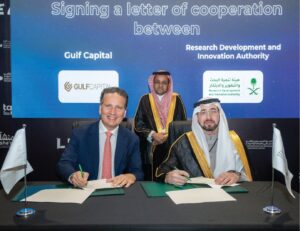Saudi Research Development And Innovation Authority (RDIA) And Gulf Capital Sign US$100 Million Investment Partnership To Support The Saudi Technology And Innovation Sector
Gulf Capital announced today that it has signed an agreement with the Saudi Research Development and Innovation Authority (RDIA) to deploy over US$100 million into the Saudi technology and innovation sector over the next five years.
The Letter of Intent (LoI) was signed in Riyadh by Dr Rami Niazi, Vice Governor of Strategy at the Saudi Research Development and Innovation Authority and Dr Karim El Solh, Co-Founder and CEO of Gulf Capital.
Gulf Capital will work closely with RDIA to enhance, support,and fund the growth of Saudi homegrown companies operating in technological innovation in the healthcare, healthtech, technology, fintech, energy, renewables, sustainability, and future economies sectors. Both parties will also cooperate to attract and facilitate the market entry of international innovation companies into the Saudi market. Gulf Capital has an 18-year track record of investing in Saudi Arabia and has deployed to date over SAR2.2 billion in investments in Saudi companies with cutting edge technologies and leading market share.
Dr Mohammed Alotaibi, General Supervisor at the Saudi Research Development and Innovation Authority, said: “Through this strategic partnership, we seek to support and enhance the professional and technical growth of local companies and to facilitate the establishment of international companies within the Kingdom to achieve national priorities for the research, development, and innovation sector and for the Kingdom to become a global centre for innovation.”
Dr Karim El Solh, Co-Founder and Chief Executive Officer at Gulf Capital said: “We are delighted to work with RDIA on this ambitious investment programme and to increase foreign direct investments into the Kingdom. Saudi Arabia is an amazing global growth story and has been moving at remarkable speed to achieve its Vision 2030 and, as a result,all of its economic indicators have been on an upward trend. The country has risen to 17th place globally and 3rd among G20 nations in the latest Global Competitiveness Report. It has also moved up 18 points in the Global Innovation Index (GII) between 2020 and 2023. This is underlined by major economic reforms that aim to boost the private sector and attract investments. The country’s economy is projected to grow by 4.4% this year. Our role, as one of the leading investors in the Kingdom and as a catalyst of growth for private companies,is aligned with this vision. We have an 18-year track record of investing in Saudi technology and innovation companies and helping them expand across Saudi Arabia and the broader region. In partnership with the RDIA, we look forward to increasing and accelerating our investments into high growth companies in the Kingdom.”
Alvaro Abella, Managing Director at Gulf Capital said: “Saudi Arabia has a burgeoning tech startup ecosystem which has positioned the country as MENA’s leading market for venture capital funding last year, according to Magnitt. Gulf Capital will work with RDIA to allocate over US$100 million to leading technology and innovation companies that are ready for scaling up into their next phase, helping them expand within the Kingdom as well as driving them to further grow regionally and globally. We will also support RDIA’s objectives of technology, innovation, and knowledge transfer into Saudi Arabia, by targeting and enticing international businesses to set up in and expand across the Kingdom.”
Gulf Capital has a large portfolio of companies operating in Saudi Arabia in the healthcare,healthtech, technology and fintech, business services, food, education, water, wastewater, oil and gas, and real estate sectors. The company has invested over SAR 2.2 billion to date in direct investments in the Kingdom. Among its largest investments is Geidea, the leading payment services provider in Saudi Arabia. Employing 900 people in Saudi Arabia, Geidea plays a crucial role in supporting SMEs, aiding in job creation, and facilitating seamless payment transactions both offline and online. This support is vital for the burgeoning SME sector, which is a cornerstone of economic development and diversification in the country.







